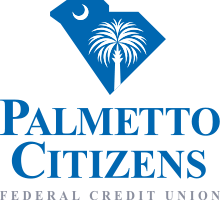Palmetto Citizens Federal Credit Union
Palmetto Citizens Federal Credit Union is a not-for-profit financial institution serving the citizens of a six county area around Columbia, South Carolina, United States, including Richland, Lexington, Kershaw, Fairfield, Calhoun and Saluda Counties. Palmetto Citizens is regulated under the authority of the National Credit Union Administration (NCUA) of the U.S. federal government. As a credit union, they do not have stockholders like banks and can return earnings to their member-owners in the form of higher savings rates, lower loan rates and fewer fees.[1]

As of November 2019, Palmetto Citizens serves over 68,000 members with assets over $895 million.[2]
History
Palmetto Citizens Federal Credit Union, formerly known as Columbia (SC) Teachers FCU, is located in Columbia, South Carolina and was organized and issued a federal charter on June 4, 1936. Ten individuals each deposited $5.00 to begin the credit union, which only served the employees of Columbia Public Schools.[3]
In later years, after the school system was divided by counties, the credit union expanded its field of membership to include the major school districts and most area private schools. Deregulation in the 1980s permitted the credit union to accept groups and organizations outside the education field, which gave even more people the benefit of credit union membership.
Today, Palmetto Citizens is one of South Carolina's larger credit unions, serving over 61,000 members with assets over $700 million.[2]
Membership
Palmetto Citizens Federal Credit Union membership is open to any individual who lives, works, worships or attends school in Richland, Lexington, Kershaw, Fairfield, Calhoun or Saluda Counties of South Carolina. Members who have immediate family within this four-county area may be eligible to join as well. Membership may also be available to businesses and legal entities operating in this area.
To begin a membership at Palmetto Citizens, one must open a primary savings account with as little as $25. This deposit will make a person a member-owner of the credit union and grant access to their products and services.
References
- "Archived copy". Archived from the original on 2011-07-29. Retrieved 2011-08-05.CS1 maint: archived copy as title (link)
- https://mapping.ncua.gov/SingleResult.aspx?ID=1472&IsCorpCU=0
- http://www.palmettocitizens.org/about/history.html